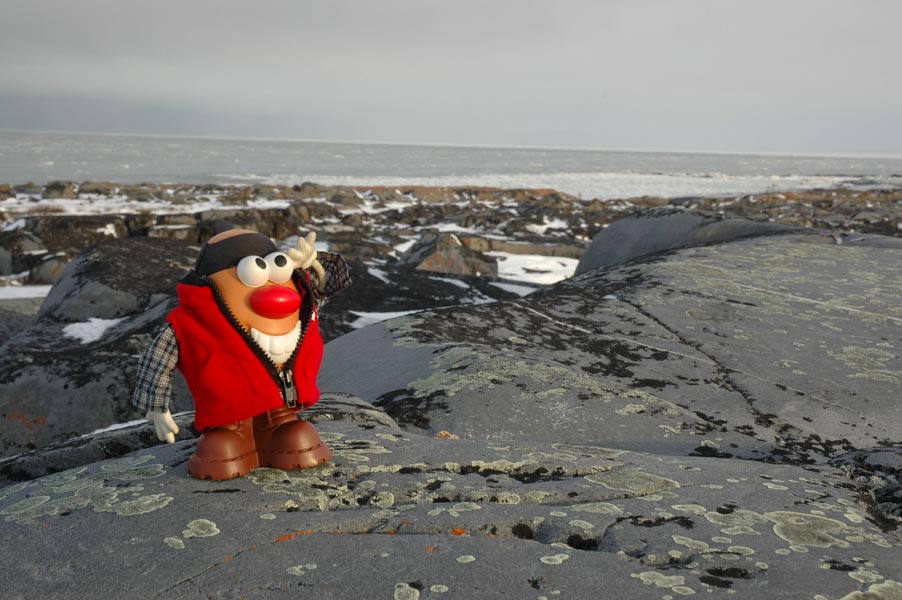
![]()
The triple digit temperatures of the hot Arizona sun are not conducive to snowfall and as a result, Spud had gone two winters without seeing a single flake - of snow that is,.. not his occasional bouts with dandruff... Being a true blue Canadian potato, he found his roots were aching for the cold of the Great White North.
Longing to return to his homeland in the dead of winter, the tater booked a flight to a place that he knew would have no shortage of the white stuff...no, not Columbia, but, Churchill, Manitoba - a frosty little port town at the mouth of Hudson Bay in Northern Canada.
Churchill is one of Canada's main ports for exporting grains and canola to other nations. Traveling from the North and through Hudson Bay is 1000 miles less distance for ships than navigating through the busy St. Lawrence Seaway, but unfortunately for Churchill, the shipping season is short as Hudson Bay freezes solid along the coastline in early November.
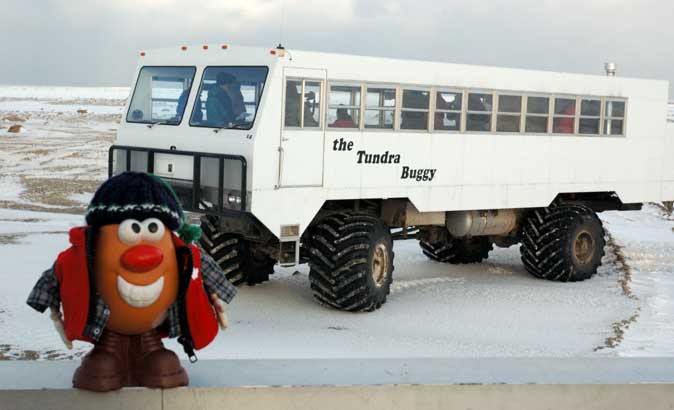 Spud
learned that Churchill's main attraction however, is not their busy summer
port. Instead, what attracts visitors from around the globe to this tiny
isolated village of 1070 inhabitants is its milk.
Nowhere else on earth do you need to to take a second mortgage out on
your house, just to buy a jug of regular, run-of -the-mill 2% milk. Oh
yeah, and there's also a lot of Polar Bears in the area - enough in fact,
that the area is considered the Polar Bear Capital of the World.
Spud
learned that Churchill's main attraction however, is not their busy summer
port. Instead, what attracts visitors from around the globe to this tiny
isolated village of 1070 inhabitants is its milk.
Nowhere else on earth do you need to to take a second mortgage out on
your house, just to buy a jug of regular, run-of -the-mill 2% milk. Oh
yeah, and there's also a lot of Polar Bears in the area - enough in fact,
that the area is considered the Polar Bear Capital of the World.
Hundreds of the bears, the largest land carnivores, congregate in the area as part of their annual migration.
Churchill is surrounded by arctic tundra:
a vast barren landscape of snow and ice, occasionally broken up by rock
from the Canadian Shield and garnished with a small selection of willow
patches and the odd battle-weary stunted white spruce. The tundra is winter
in its rawest form: a canvas of white, continually sculpted by relentless,
biting winds from the icy waters of the Bay. It is here that the polar
bears gather at the beginning of the winter and wait patiently for the
waters of the Bay to freeze.
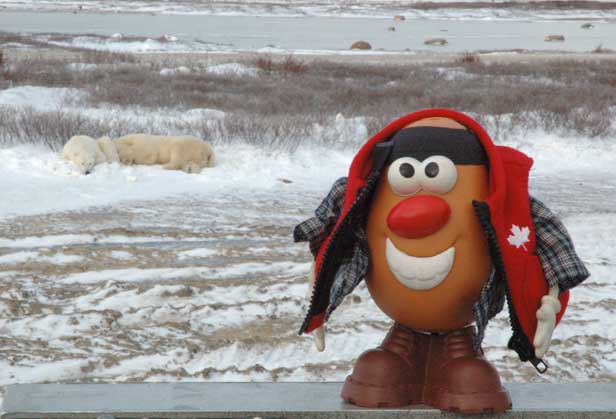 These
mammoth creatures (weighing up to 1750 lbs (~800 kg) and measuring 8-11.5
feet (2.5-3.5 metres) in length), have been surviving the summer and fall
primarily on willows and kelp from the tidal pools, however they are the
furthest thing from being vegetarians. Polar Bears sit on top of the food
chain, and would much prefer chowing down on a poor hapless seal than
sitting at a trendy bistro picking at an arugula salad. As the Bay freezes,
the bears move northward, onto the ice floes, and work their way up to
the main buffet; where the ringed seals are found. The great white bears
will then commence an eating frenzy, devouring as many seals as they can
'til either heartburn sits in, or they have beefed up sufficiently to
withstand the harsh winter's subzero temperatures.
These
mammoth creatures (weighing up to 1750 lbs (~800 kg) and measuring 8-11.5
feet (2.5-3.5 metres) in length), have been surviving the summer and fall
primarily on willows and kelp from the tidal pools, however they are the
furthest thing from being vegetarians. Polar Bears sit on top of the food
chain, and would much prefer chowing down on a poor hapless seal than
sitting at a trendy bistro picking at an arugula salad. As the Bay freezes,
the bears move northward, onto the ice floes, and work their way up to
the main buffet; where the ringed seals are found. The great white bears
will then commence an eating frenzy, devouring as many seals as they can
'til either heartburn sits in, or they have beefed up sufficiently to
withstand the harsh winter's subzero temperatures.
Spud had brought along his camera gear so that he could photograph these amazing creatures. Since the bears don't come into Churchill, Spud had to go to them. As there are no roads on the tundra, the potato booked a ride on a Tundra Buggy - a monstrous 4-wheel drive vehicle specially equipped for crossing the notoriously unpredictable and ever-changing tundra. The tundra buggy is a true off-road machine. These ~5 ton/tonne giants stand about 15 feet (5 metres) tall and take craps bigger than the size of your average Hummer.
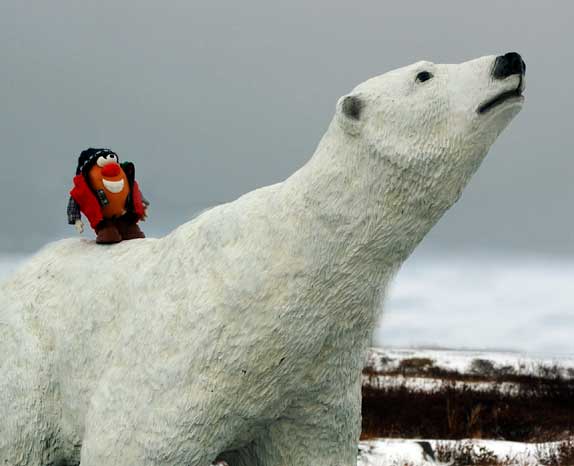 The
tater climbed aboard and the behemoth buggy rumbled onto the frozen tidal
flats. It didn't take long before Spud spotted some of the white bruins,
huddled in the willows.
The
tater climbed aboard and the behemoth buggy rumbled onto the frozen tidal
flats. It didn't take long before Spud spotted some of the white bruins,
huddled in the willows.
One of the enormous bears rose to its feet, and slowly sauntered across the flat toward the buggy.
The bear stopped a few feet short of the vehicle and reared up on its hind legs - drawing Spud's zesty baked aroma into its flaring nostrils. After months of eating seaweed and sticks, the thought of indulging in a tasty carbohydrate made the colossal carnivore salivate in anticipation.
The bear dropped to its paws and charged the buggy. With a tremendous crunch, he sunk his huge teeth deep into one of the vehicle's tires; puncturing it like a blood blister. The arctic jalopy sagged on its flat; giving just enough purchase for the bear to climb aboard.
The driver shrieked in terror and scrambled to the roof of the injured tundra transport. Spud was equally as frightened, but his escape route was blocked by the 1500 lb beast. The bear raised a sheepdog sized paw that was armed with a forest of razor sharp claws. In a final effort to flee, the tato jumped onto the back of the famished forager and out of the path of the bear's massive mitt.
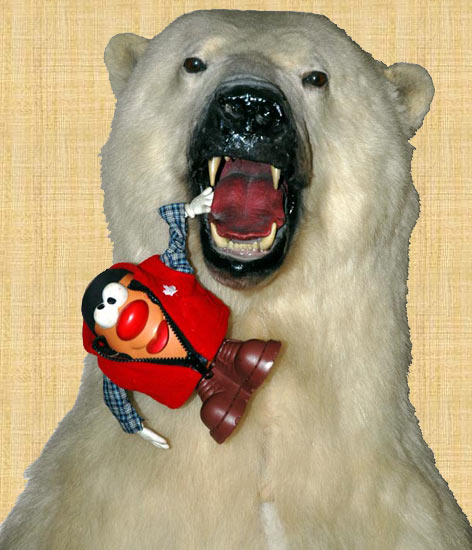 The
beast let out a tremendous roar and began to shake violently to dislodge
the terrified tater. Spud lost his grip and was thrown into a nearby snowbank.
Next thing he knew, the polar bear had pounced; his vice-like jaw clamping
down on the side dish's arm. Fortunately for Spud, his arm was rubber
and had no nerve endings. Still, the tuber did not have a spare arm with
him on this trip and couldn't afford to lose this one.
The
beast let out a tremendous roar and began to shake violently to dislodge
the terrified tater. Spud lost his grip and was thrown into a nearby snowbank.
Next thing he knew, the polar bear had pounced; his vice-like jaw clamping
down on the side dish's arm. Fortunately for Spud, his arm was rubber
and had no nerve endings. Still, the tuber did not have a spare arm with
him on this trip and couldn't afford to lose this one.
The bear clenched Spud's arm tightly and swung his head vigorously from side to side - trying to separate the potato from his appendage. The sound of breaking glass could be heard and a dark, syrupy liquid foamed out of the potato's rear compartment. Just then, Spud remembered that he had brought a six pack of Coke from home, as soda pop was almost $2 a can in Churchill. The quick-thinking tato opened his trapdoor with his free hand, pulled out a cold one.and tossed it into a patch of arctic scrub on the ground.
The bear saw the bottle of Coca-Cola and immediately lost all interest in the potato. Its massive jaw released its hold of Spud's arm and the side dish fell into a snowbank. The bear reached down and picked up the bottle. It then sat on its hind quarters and stared longingly at the soft drink engulfed in its immense paws. The dazed carbohydrate figured that the carnivore was wondering where he was going to get a bottle opener.
Happy to have survived the close call, Spud acknowledged that he had his fill of the Frozen North and was ready to return to the Valley of the Sun in Arizona.
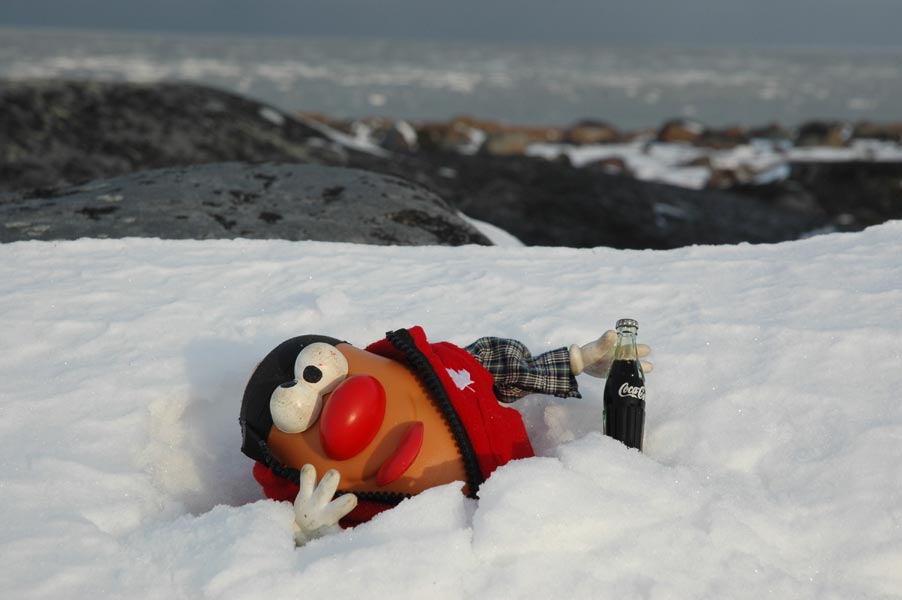 .
.
CLICK
HERE for more adventures in Manitoba